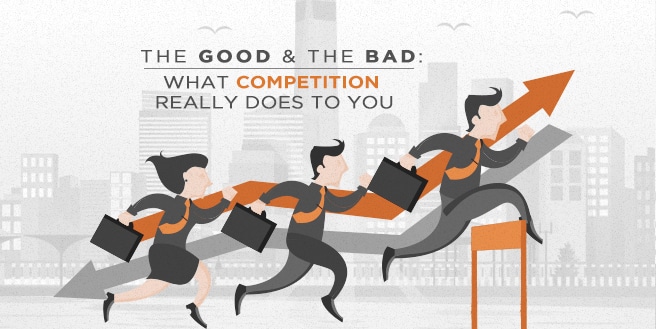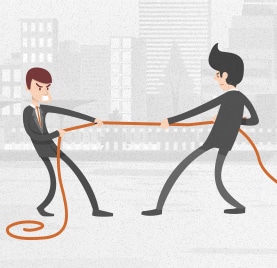The Good & The Bad: What Competition Really Does to You

“Survival of the fittest”
For years, we’ve lived by Charles Darwin’s words – those who adapt with the opportunities and risks presented by nature will have better chances of surviving – and we’ve applied this in various aspects in our lives.
This, of course, resulted to a culture bred by constant competition. In school, we competed against our classmates for awards. In the University, we competed with friends and in certain circumstances, we compete with a few family members. That’s why it doesn’t come as much of a surprise when we compete with our colleagues in the office.
For decades, numerous companies have created an environment wherein employees compete against one another for bonuses, promotions and even recognition. This Darwinian approach to corporate culture have always received a mixed amount of commendation and criticism.
Why It’s Good For You

Studies have suggested that competition can motivate a person to improve the quality of their work and help boost their creativity. In addition to that, skills like willingness to push past boundaries, trusting one’s instinct and problem solving are being developed. These are the same skills needed for innovation.
It increases productivity – igniting a fire in a workforce and motivates employees to work harder in order to keep their position – and at the same time, it helps increase overall efficiency of the firm.
Competition also helps employees identify their strengths and weaknesses. It allows them to narrow their focus on what they’re good at and concentrate on improving the areas that they are lacking. In addition to this, it pushes individuals out of their comfort zones, makes them strive harder in order to become better and allows them to break boundaries.
Why It’s Bad For You
Despite of the numerous statistics and studies showcasing the positive effects of competition, it is also important to note that every individual’s motivation and creativity can be accessed in various ways.
Authors of the book “Top Dog: The Science of Winning and Losing” quoted a research that says 25% of people have a hard time under too much competition and become disengaged but 50% of employees benefit from it. All the while the remaining 25 percent are not affected by it. They also mentioned that there’s even a gender gap as well.
When the environment gets too competitive, it kills morale, causes stress and fosters petty politics and backstabbing. It narrows an individual’s cooperation among his or her coworkers. The fear and anxiety too much competition elicits can affect how a person behaves – how the competition makes a person feel dictates how they would try to win.
Finding a Middle Ground
Though it seems like finding out a way to get the right amount of competition that could be beneficial to everyone in the enterprise is hard, it’s best to strive for the middle ground.

University of Toronto psychologist Jordan B. Peterson said that competitive games are also cooperative games. Take for example basketball; each team are competing against one another and every member of the respective teams are cooperating to win the game. At the same time, each player from both teams are competing against one another to become the best player by the end of the game.
“Cooperative Competition” suggests that by working together, each member pushes the other to be more productive and produce better output. According to the author of the book The Leadership Brain for Dummies, cooperation among one another releases brain chemicals that enhance bonding, motivation and pleasure.
And as more and more members of the workforce demand for a little less competition and a little more cooperation, a new kind of workspace have been discovered.
Made to foster a community that values collaboration and lessens internal competition, “Coworking Spaces” is a new kind of flexible workspace made to house freelancers and young professionals from all kinds of industry. With an office space setup, it opens an individual up to the chance of meeting talented people from different places without the need to compete with them.
At the end of his discussion, Dr. Peter says “And the victory that you attain across the set of all games isn’t winning all the games: it’s being invited to play.” Winning confuses us and blinds us from the truth that playing among talented members makes the game more meaningful.
Are you ready to play along and win – or lose – with everyone? Join us then!












Trackbacks & Pingbacks
Regards, Wonderful information.
Leave a Reply
Want to join the discussion?Feel free to contribute!